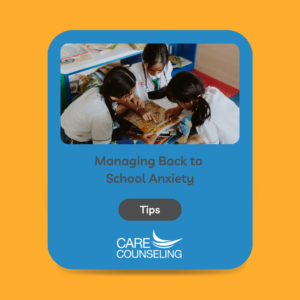Managing Back-to-School Anxiety
 The back-to-school season can be an exciting time, but it also comes with its fair share of challenges, especially for parents and students dealing with anxiety. Whether your child is starting school for the first time or returning to a new grade, feelings of nervousness, stress, and uncertainty are entirely normal. As parents and caregivers, it is essential to provide the right support and guidance to help your child navigate through these emotions and ensure a smooth transition. In this blog post, we will explore some practical tips for managing back-to-school anxiety for both parents and students.
The back-to-school season can be an exciting time, but it also comes with its fair share of challenges, especially for parents and students dealing with anxiety. Whether your child is starting school for the first time or returning to a new grade, feelings of nervousness, stress, and uncertainty are entirely normal. As parents and caregivers, it is essential to provide the right support and guidance to help your child navigate through these emotions and ensure a smooth transition. In this blog post, we will explore some practical tips for managing back-to-school anxiety for both parents and students.
- Open Communication:
Effective communication is the cornerstone of addressing back-to-school anxiety. Encourage your child to share their feelings, fears, and concerns openly. Create a safe and non-judgmental space for them to express themselves. Listen attentively and validate their emotions, letting them know it is okay to feel anxious during this time of change. Assure them that you are there to support them throughout the school year.
- Familiarize with the School Environment:
For students starting at a new school, visiting the campus before the academic year begins can help ease anxiety. Familiarize them with classrooms, the cafeteria, and other essential areas. If possible, arrange a meeting with teachers or school staff so that your child can establish some connections before the first day.
- Create a Predictable Routine:
Predictability provides a sense of security for anxious children. Before school starts, establish a daily routine that includes a set wake-up time, meals, study time, and bedtime. Having a consistent schedule can alleviate anxiety by providing structure and stability in their day-to-day life.
- Practice Relaxation Techniques:
Teaching your child relaxation techniques can empower them to manage anxious feelings effectively. Breathing exercises, mindfulness, and visualization are simple yet powerful tools for reducing stress. Encourage your child to practice these techniques regularly, especially when they feel overwhelmed.
- Focus on the Positives:
Shift the focus from potential negatives to positive aspects of the new school year. Talk about exciting opportunities, new friends, and interesting subjects. Help your child see school as an environment for growth, learning, and new experiences rather than solely a source of stress.
- Set Realistic Goals:
Work with your child to set achievable goals for the school year. Break down larger objectives into smaller, manageable tasks. Celebrate their achievements along the way, reinforcing a sense of accomplishment and boosting their confidence.
- Collaborate with Teachers:
Establishing a positive relationship with your child’s teachers can make a significant difference in managing back-to-school anxiety. Share your child’s concerns and discuss strategies that can be implemented in the classroom to support their emotional well-being.
- Limit Media Exposure:
Constant exposure to distressing news or social media can exacerbate anxiety in both parents and students. Limit screen time, especially before bedtime, to ensure a restful sleep and reduce feelings of apprehension.
- Encourage Social Connections:
Help your child build social connections with peers. Arrange playdates or attend school-related events to foster friendships. Having friends at school can provide a sense of belonging and reduce feelings of isolation.
- Seek Professional Support if Needed:
If your child’s anxiety significantly impacts their daily life and functioning, consider seeking professional support from a qualified mental health professional. A therapist can provide personalized strategies and coping mechanisms to address the specific challenges your child may be facing.
Managing back-to-school anxiety requires patience, understanding, and proactive effort from parents and caregivers. By implementing these practical tips, you can create a supportive environment that empowers your child to face their fears and uncertainties with confidence. Remember, every child’s journey is unique, so embrace their progress and celebrate their resilience throughout the school year. With the right approach and guidance, back-to-school anxiety can be effectively managed, allowing your child to thrive academically and emotionally.



























